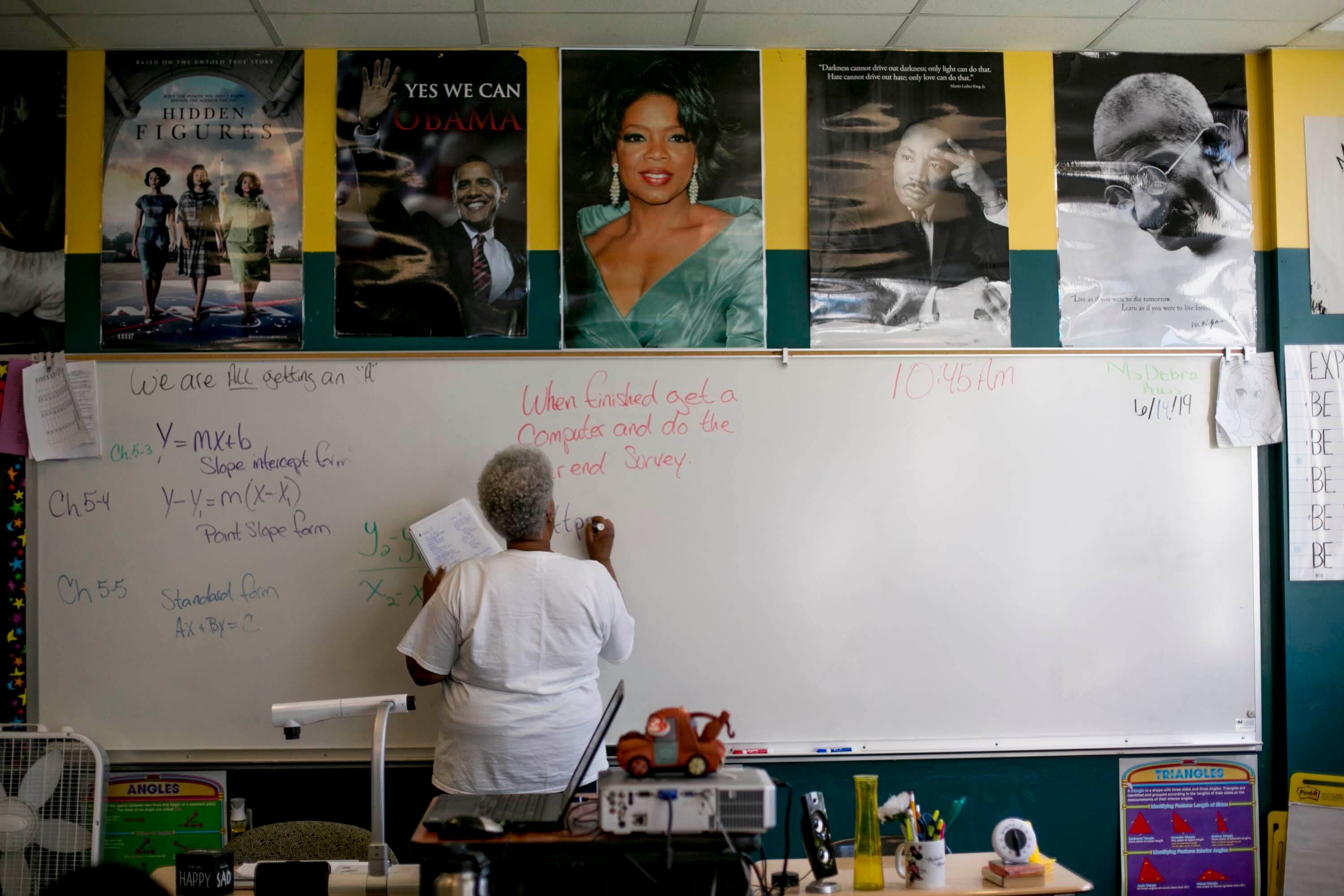Sign up for Chalkbeat Detroit’s free daily newsletter to keep up with the city’s public school system and Michigan education policy
Average starting salaries for Michigan teachers lag behind most other states at a time when many school districts in the state are struggling with teacher shortages and the profession is becoming increasingly unappealing to those seeking careers.
That is one of the key findings in a new report from Michigan State University researchers that also finds that the average overall salary for Michigan teachers is now below the national average, after many years of being among the highest in the U.S.
The report, “Teacher Compensation in Michigan: Recent Trends and Public Opinion,” was released last month by the Education Policy Innovative Collaborative. It includes results of a public opinion poll of Michigan residents that shows wide support for increasing pay for new teachers.
Teacher pay is a critical issue in Michigan, as it is elsewhere in the country. There are wide disparities in pay between districts, with wealthier districts able to pay their teachers more. Shortages affecting many districts — especially in science, math, special education, and career and technical education — make it more attractive for teachers to move around in search of higher pay, creating instability. Often, that instability affects the most vulnerable students.
Jason Burns, one of the authors of the report and a research specialist at EPIC, said he hopes the findings will spur “a more informed debate on the topic.”
Here are some of the key findings in the report:
- The average starting salary in Michigan was $38,963 during the 2021-22 school year, ranking 39th in the nation.
- The average teacher salary in Michigan in 2021-22 was $64,884, 16th in the nation and below the national average of $66,745. During the 2012-13 school year, Michigan’s average was $61,560, 11th in the nation and above the national average of $56,065. That’s a 5% increase for Michigan over that time, compared with a 19% increase nationally.
- Adjusted for inflation, Michigan teacher salaries have been on a steady decline. The report says that “if salaries had kept pace with inflation since 1999, the average Michigan teacher would have earned $81,703 in the 2021-2022 school year.”
- In a recent survey of Michigan residents, 76% said they believe starting teacher salaries should increase, while 43% felt the same for average teacher salaries.
The teacher salary data is based on 2021-22 data, the most recent available for the report.
Michigan’s average teacher salary ranking has declined in part because many other states have moved to increase teacher salaries. Burns said Maryland, Delaware, Georgia, Florida, Oklahoma, Mississippi, Idaho, and Utah are among those that have moved to increase teacher salaries, mostly by boosting the minimum amount teachers can earn but in some cases raising salaries for all teachers. A Michigan bill last year that would have set a minimum salary of $50,000 for starting Michigan teachers failed.
The fact that this movement to increase teacher pay is happening in both blue and red states is interesting, Burns said.
“In education, a lot of things wind up being partisan these days,” he said. “But looking at what’s happening across the country, it’s been a very bipartisan kind of effort in terms of who is actually taking action on the issue of teacher salaries.”
Chandra Madafferi, president of the Michigan Education Association, heard a presentation on the EPIC report recently. Her reaction? “Coming from the classroom, I knew it was bad. I didn’t know it was this bad.”
She said there is inconsistency in teacher salaries across Michigan, with often a $20,000 difference at the top of the pay scale between those districts that “pay really, really well and those who don’t. So the inequity is still very apparent.”
Madafferi said she appreciates that Gov. Gretchen Whitmer has made historic investments in public education, “because in many places, things are better than they have been.
“In many places, pay is going up. Things are getting better but there’s still so much that has to be done,” she said.
For instance, Madafferi said many districts are dealing with infrastructure and facility issues that require expensive fixes. If they can’t get that covered through a bond proposal, the money to fix the issues comes out of general funds, leaving less money to cover teacher pay increases.
“I have had multiple superintendents say to me, ‘I want to pay my educators more,’ or ‘I want to pay teachers more, however, we just can’t.’”
The report also highlights research from the Economic Policy Institute that finds that nationally, teachers earn 26.4% less than similarly educated college graduates. In Michigan, teachers earn 21% less. The gap is referred to as the teacher penalty.
Burns said research from the Federal Reserve Bank found a similar gap — 18% to 20% lower pay for teachers.
That kind of data is concerning to people like Armen Hratchian, executive director of Teach For America Detroit. TeachMichigan, a program of TFA Detroit, seeks to recruit and retain educators.
A 21% pay gap “is a real penalty,” Hratchian said.
“We have financially made this uncompetitive, and then we aren’t supporting folks in the way we should be,” Hratchian said. “What we’ve shown is when you do that, well, it strengthens the profession.”
Lori Higgins is the bureau chief for Chalkbeat Detroit. You can reach her at lhiggins@chalkbeat.org.






